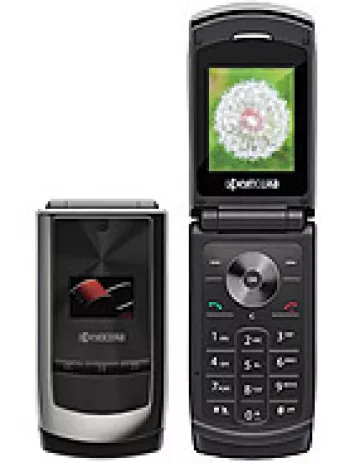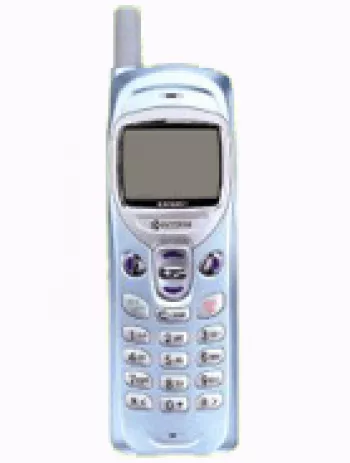
Overview of Kyocera E2500
The Kyocera E2500 is a straightforward feature phone that was announced in April 2008, and later released in the same month. Designed for practicality and ease of use, this handset offers basic functionalities suitable for people looking for a simple communication device. It is especially recognized for its minimalist design and reliable performance in the realm of feature phones.
Design and Build
The Kyocera E2500 is housed in a compact and lightweight body, measuring 105 x 48 x 12 mm and weighing just 69 grams. This makes it extremely portable and easy to carry around. Its build is robust enough, given the demands of its time, and it features a classic candybar form that was prevalent in mobile designs during the late 2000s.
The phone sports a Mini-SIM slot, offering the necessary connectivity of its era. Its design simplicity is an advantage for users looking for basic interaction without complicated navigation, making it especially ideal for older demographics or kids as a first phone.
Display Features
The device includes a 2.0-inch CSTN display, capable of showing 65K colors. It holds a screen-to-body ratio of about 25.6%, with a resolution of 128 x 128 pixels, translating to a pixel density of approximately 91 ppi. Although the display might appear underwhelming by today’s standards, it was quite standard for feature phones of its time, focusing on providing enough visual clarity for text and basic images.
Camera Specifications
Featuring a single 1.3 MP camera, the Kyocera E2500 allows users to capture basic photographs. However, it lacks video recording capabilities. This camera specification was considered satisfactory for casual snapshots, especially for a device not intended to function primarily as a multimedia tool.
Battery Life
Powered by a removable Li-Ion 920 mAh battery, the Kyocera E2500 offers dependable battery life. It provides up to 400 hours of stand-by time and up to 5 hours of talk time, making it suitable for users who need a long-lasting mobile device for voice communication rather than extensive online browsing or app usage.
Network and Connectivity
The phone supports GSM technology with 2G bands including GSM 850, 900, 1800, and 1900. For data connectivity, it includes support for GPRS Class 10 and EDGE Class 10. However, it does not offer Wi-Fi connectivity, indicative of its feature phone status. Bluetooth 1.2 with A2DP allows for basic wireless file exchanges.
Storage and Memory
The Kyocera E2500 is equipped with a microSD card slot, allowing users to expand storage for more contacts or messages. It includes standard phonebook and call records functionalities, addressing the basic storage needs for personal data and communication history.
Communication and Extras
In terms of communication features, the device supports SMS, MMS, and Email, catering to traditional forms of messaging. The built-in browser is WAP 2.0/xHTML compliant, sufficient for basic web navigation. Additionally, the device comes with a selection of games, enhancing its entertainment value.
Java MIDP 2.0 support is available, providing a platform for executing standard Java applications, which was a beneficial feature for users eager to personalize their devices with downloadable content.
Sound and Media
Kyocera E2500 is fitted with a loudspeaker; however, it lacks a 3.5mm audio jack, which limits the option for conventional wired headphones. This could be considered a limitation for users who prefer private listening experiences on their mobile devices.
Price and Market Positioning
At its launch, the Kyocera E2500 was priced at approximately 70 euros, positioning it within the affordable range for feature phones. This pricing strategy made it accessible, especially appealing to consumers who needed an economical phone without the complexities of smartphones.
Conclusion
The Kyocera E2500 serves as a reminder of simpler times in mobile technology—a period before smartphones dominated the market. Its straightforward features and durable design underline its role as a reliable tool for communication. Although discontinued, the E2500 remains a noteworthy example of feature phones from the late 2000s, demonstrating the balance between essential functionality and cost-effectiveness.
Key Features of Kyocera E2500
- Lightweight design weighing only 69 g (2.43 oz)
- Compact dimensions making it easy to handle: 105 x 48 x 12 mm
- GSM network capability supporting 850/900/1800/1900 bands
- Expandable microSD memory card slot
- 1.3 MP main camera for basic photography
- Bluetooth 1.2 with A2DP support
- Removable Li-Ion 920 mAh battery offering up to 400 hours of standby time
- WAP 2.0/xHTML browser for internet access
- Messaging support for SMS, MMS, and Email
- Support for Java applications (MIDP 2.0)
Disadvantages of Kyocera E2500
- No 3G or 4G network support, only GSM (2G bands)
- Discontinued; no longer supported
- Low-resolution display with CSTN technology and only 65K colors
- Limited screen-to-body ratio (~25.6%)
- Only 1.3 MP main camera, no video recording capability
- No front-facing selfie camera
- Lack of 3.5mm headphone jack
- No WLAN (Wi-Fi) connectivity
- No GPS positioning
- No built-in radio
- Limited Bluetooth version (1.2)
- No advanced sensors

View Also
More Phones
All Rights Reserved +13904 Phones © Mobilawy 2025

























